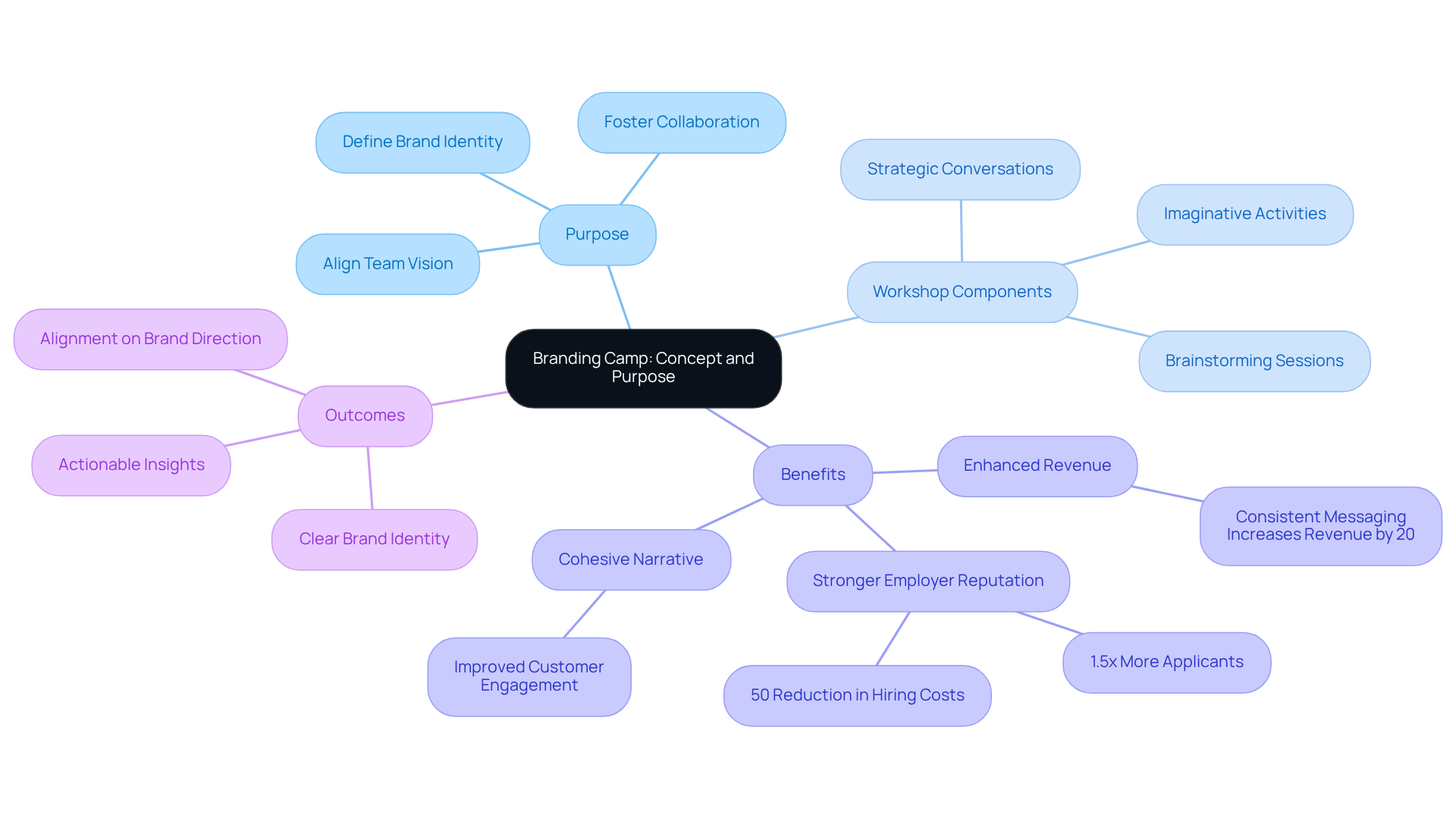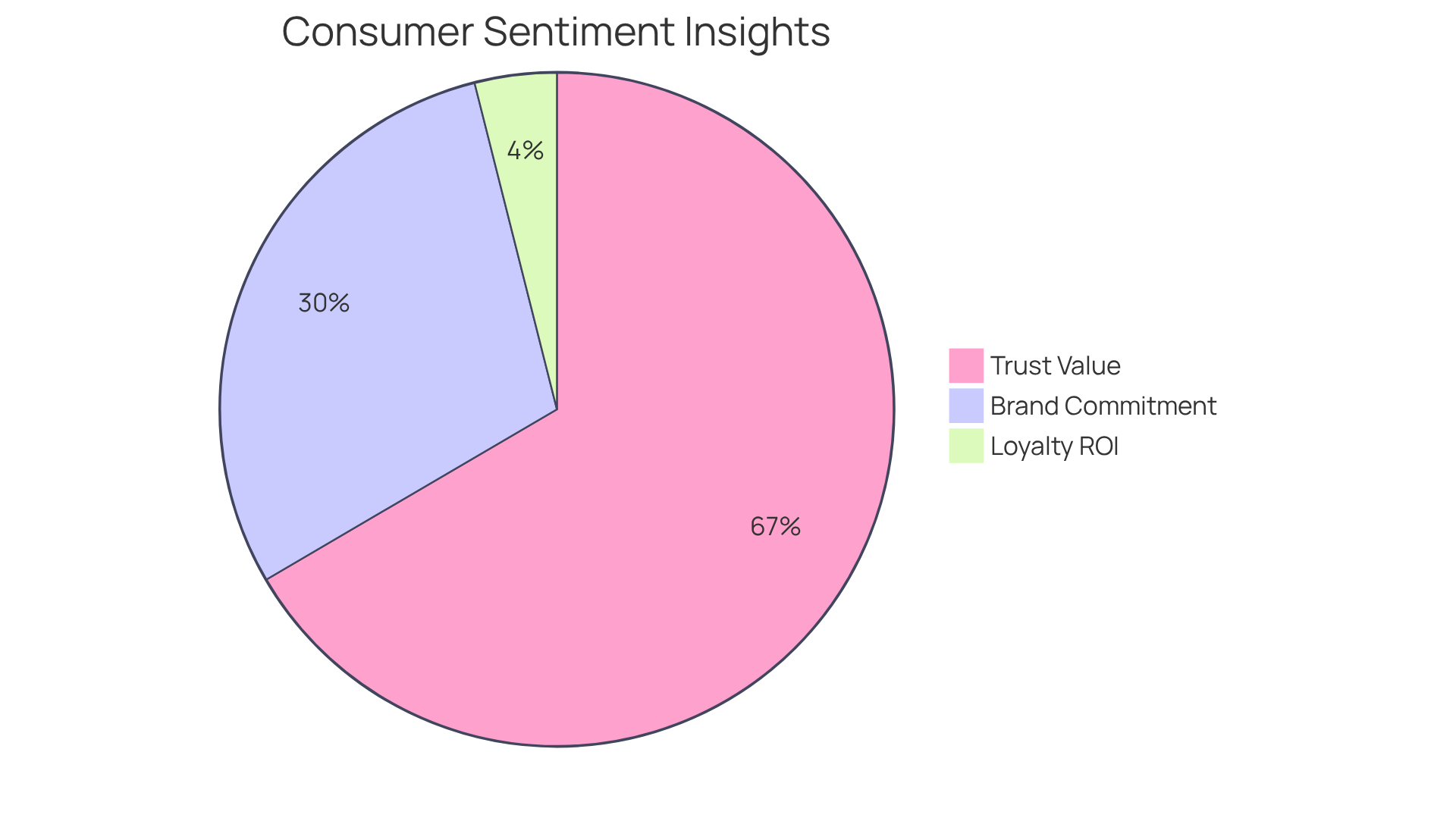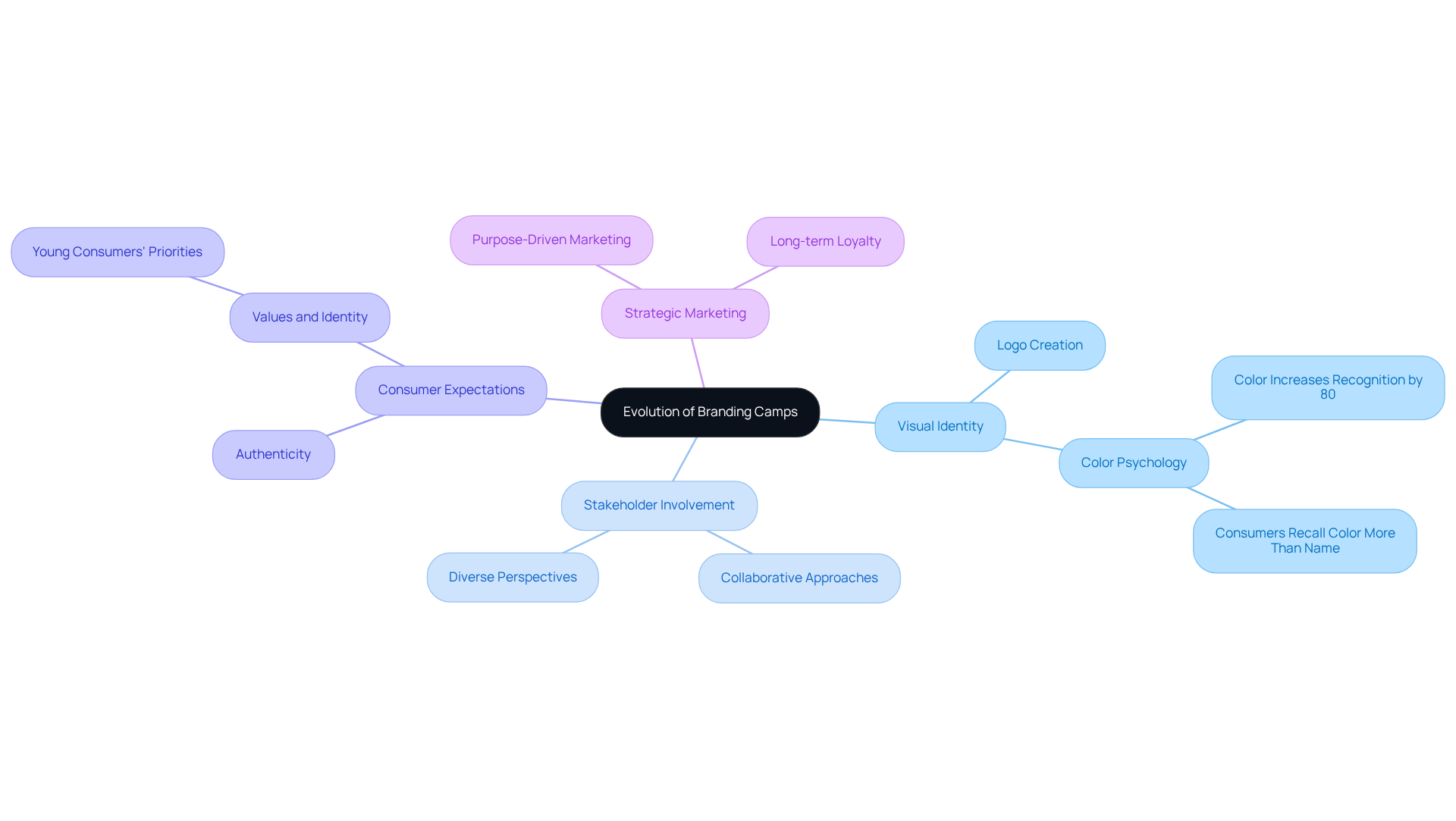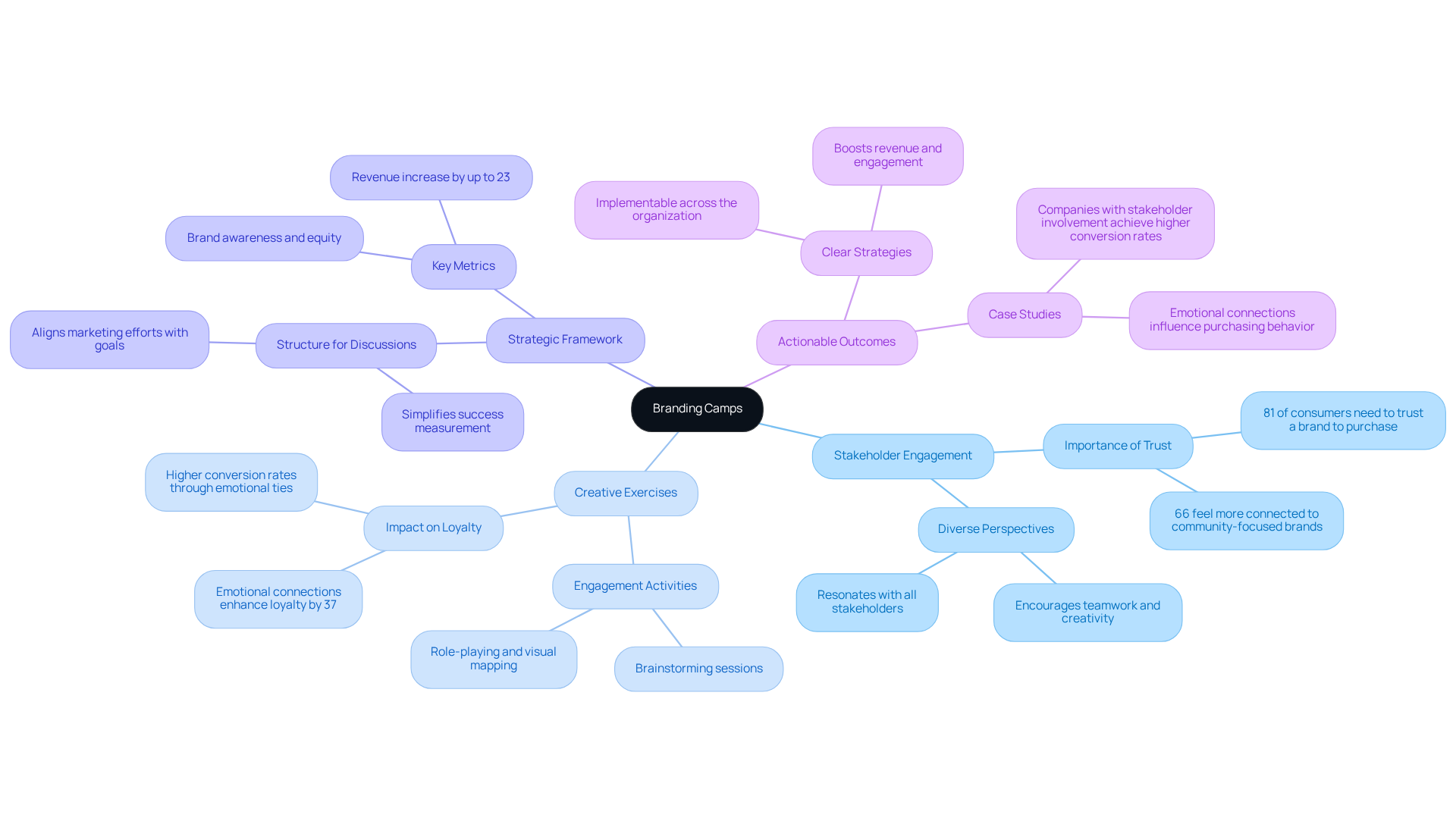Overview
Branding camps play a crucial role for organizations striving to define and enhance their brand identity. These workshops foster collaboration among stakeholders, bringing everyone together to develop actionable marketing strategies. However, many organizations face internal misalignments, which can create tension and hinder progress. This misalignment not only affects team cohesion but can also impact brand perception and customer loyalty.
The good news is that branding camps can address these challenges. By participating in these nurturing workshops, teams can strengthen their bonds and work towards a unified vision. As a result, organizations often experience significant improvements in brand perception and customer loyalty, ultimately leading to measurable business success. It's a supportive solution that empowers teams to thrive together.
Introduction
In a world where consumer preferences shift at lightning speed and competition is fierce, many brands find themselves grappling with the challenge of establishing a clear identity. This struggle can leave teams feeling disoriented and uncertain about their direction.
Branding camps emerge as a nurturing solution, providing organizations with a structured environment to refine their messaging and align their teams around a cohesive vision. However, as companies invest in these collaborative workshops, a pressing question arises: how can they ensure that the insights gained translate into lasting brand loyalty and market success?
By exploring the key features and benefits of branding camps, we not only uncover their importance but also the strategic advantage they offer in today’s dynamic business landscape. Together, we can navigate these challenges and foster a sense of community and support that empowers brands to thrive.
Define Branding Camp: Concept and Purpose
A marketing workshop serves as an intensive session or collaborative event designed to help organizations define, refine, and elevate their identity. Many founders face the challenge of aligning their team around a clear vision, mission, and values. This misalignment can lead to confusion and diluted messaging, impacting how their brand is perceived in the market. At RNO1, we understand how this can feel overwhelming, and our promotional workshops aim to provide a nurturing environment where stakeholders can come together to develop strategies that effectively convey their identity to the target audience.
Our workshops typically include brainstorming sessions, imaginative activities, and strategic conversations, all designed to foster collaboration. This results in practical marketing strategies that can significantly influence product perception. We believe that results are paramount, and our ensures that from day one, we focus on delivering measurable success through collaborative strategies. This commitment to achieving genuine outcomes is evident in our workshops, where we help create purpose-driven identities through strategic activation and design empowerment, offering services like Strategy & Experience Guidelines and Go-To-Market Strategy.
The impact of promotional programs is notable; uniform messaging can enhance revenue by over 20%. Additionally, 94% of marketers believe that personalized marketing positively impacts brand-building. This highlights the importance of customizing strategies to connect with audiences. By fostering cooperation among team members, a branding camp creates a cohesive narrative that distinguishes their identity in a competitive market and enhances customer involvement. This collaborative approach is vital, especially considering that nearly half of companies release off-message content at least a few times a year, which can weaken their identity and confuse consumers.
Moreover, identity workshops can address internal conflicts about brand direction, ensuring that every perspective is acknowledged and unified. This alignment is crucial because companies with a strong employer reputation receive 1.5 times more applicants and can cut hiring costs by up to 50%. Ultimately, participating in a branding camp is essential for organizations looking to strengthen their identity and enhance their go-to-market strategies. Investing in these workshops is a valuable step in today’s dynamic business environment, and we are here to support you on this journey.

Contextualize Branding Camps: Importance for Modern Brands
In today's fast-paced digital environment, many companies find themselves grappling with a complex landscape filled with fierce competition and rapidly changing consumer preferences. This situation can feel overwhelming, especially for contemporary businesses striving to establish a strong digital presence and connect meaningfully with their audience.
Branding workshops emerge as a nurturing solution, offering a systematic approach for companies to reflect on their identity and adapt to these shifts. For example, RNO1's strategic rebranding of Founder's Haven serves as a testament to how such initiatives empower modern founders to flourish in the digital realm. Additionally, RNO1's expertise in performance marketing, particularly in hyper-scaling eCommerce—as seen in their collaboration with Cirkul—highlights their capability to foster significant growth for tech startups.
By participating in branding camps, companies can cultivate innovation, enhance collaboration, and ensure their branding strategies align with their overarching business goals. This alignment is vital for nurturing and achieving sustainable growth in a competitive market.
It's worth noting that:
- 88% of global shoppers deem it essential to trust the products they purchase or use, underscoring the critical role of trust in buyer-product relationships.
- Companies investing in loyalty programs can witness a remarkable 5.2x return on investment, illustrating how thoughtful marketing initiatives can bolster such strategic efforts.
- 39% of shoppers feel less committed to brands than they did a year ago, making the significance of promotional strategies in maintaining customer loyalty increasingly apparent.
Case studies, like RNO1's transformative digital identity collaborations with various clients, vividly demonstrate how promotional initiatives can substantially enhance a brand's online presence and consumer engagement, ultimately paving the way for long-term success in a competitive landscape.

Trace the Origins of Branding Camps: Evolution and Development
The evolution of branding camps highlights a significant challenge within the marketing industry. Initially, brand development was primarily about visual identity and logo creation, as seen in Pepsi's notable $1 million logo redesign. However, as markets became more saturated and buyer expectations rose, companies faced the need for a more comprehensive approach to identity. By the late 20th century, the concept of branding camps began to emerge, emphasizing the importance of involving diverse stakeholders in the identity process. This shift signals a departure from traditional marketing methods, moving towards collaborative and strategic approaches that help companies navigate the complexities of modern consumer behavior and technological advancements.
Consider this: over half of initial perceptions of a label are visual. This statistic underscores the necessity of with deeper narratives connected to the label. Companies must recognize that it's not just about aesthetics; it's also about the stories they tell. As businesses adapt to this changing landscape, prioritizing authenticity and purpose-driven marketing becomes essential. Consumers today increasingly seek meaningful connections, aligning their values with those of the brands they support. Young consumers, in particular, are deeply invested in values, identity, and innovation, prompting companies to evolve their strategies in response.
This evolution in marketing strategies not only enhances brand recognition—color can boost recall by up to 80%—but also fosters long-term loyalty in a competitive marketplace. Take McDonald's, for example. Its branding evolution illustrates how a consistent visual identity and strategic marketing have played a crucial role in building global recognition and consumer trust. By embracing these changes, companies can cultivate a sense of community and support among their audiences, ultimately leading to more meaningful connections.

Identify Key Characteristics of Branding Camps: Structure and Components
Branding camp addresses a common challenge faced by many startups: effective brand development. Without a , businesses struggle to connect with their audience, leading to missed opportunities and diminished trust. This can be particularly painful for startup founders who pour their heart and soul into their ventures, only to find that their message isn't resonating as intended.
To combat this, branding camps emphasize several key components that nurture brand identity and foster connection.
- Stakeholder Engagement is vital; involving team members from various departments ensures that diverse perspectives are embraced. This holistic approach not only encourages teamwork and creativity but also helps in developing a name that resonates with all stakeholders. Research shows that 81% of consumers need to trust a label before making a purchase, underscoring the importance of building that trust through inclusive marketing processes. Moreover, 66% of customers feel more connected to companies that foster a sense of community, highlighting the necessity for stakeholder involvement in marketing initiatives.
- Additionally, Creative Exercises play a crucial role. Engaging participants in activities like brainstorming sessions, role-playing, and visual mapping opens the door to new ideas and concepts. These exercises not only spark creativity but also help participants forge emotional connections with the company, enhancing customer loyalty by 37%. Companies that successfully evoke these emotional ties often see significantly higher conversion rates, further validating the importance of these activities.
- A solid Strategic Framework is also essential. Utilizing established marketing frameworks provides structure to discussions and outcomes, ensuring that all marketing efforts align with the organization's goals. This strategic approach simplifies the measurement of success through metrics such as brand awareness and equity, making it easier for founders to track their progress.
- Ultimately, the goal of a marketing camp is to produce Actionable Outcomes. A clear, actionable strategy that can be implemented throughout the organization is crucial. Consistent marketing efforts can boost revenue by up to 23% and enhance customer engagement. Case studies reveal that companies involving stakeholders in their marketing processes not only cultivate loyalty but also achieve higher conversion rates, as emotional connections greatly influence purchasing behavior.
By focusing on these essential characteristics, branding camps enable startups to align their brand identity with their business objectives, ensuring a cohesive and impactful presence in the market. Together, we can navigate the complexities of branding, fostering a supportive community where every founder feels understood and equipped to succeed.

Conclusion
Participating in branding camps can truly transform your organization, equipping you with the essential tools to clarify and enhance your brand identity. These workshops are more than just events; they represent a heartfelt investment in the future of your marketing efforts. By fostering collaboration and alignment among your team members, branding camps create a cohesive narrative that resonates with both your internal stakeholders and external audiences.
In today’s competitive landscape, it’s crucial to recognize the importance of branding camps. They address the common challenges of stakeholder engagement, creative exercises, and the establishment of a strategic framework, each playing a vital role in nurturing your brand's identity. Statistics reveal the necessity of trust and emotional connection in consumer relationships, highlighting that a well-defined brand can significantly influence customer loyalty and drive business growth.
As consumer preferences shift rapidly and competition intensifies, embracing branding camps is essential for any business that aspires to thrive. By investing in these workshops, you not only enhance your marketing strategies but also cultivate a deeper connection with your audience. As your brand continues to evolve, your commitment to authenticity and collaboration will be the cornerstone of sustainable success. Taking action now to participate in a branding camp could very well unlock your brand's full potential in the marketplace.
Frequently Asked Questions
What is a branding camp?
A branding camp is a marketing workshop designed to help organizations define, refine, and elevate their identity through collaborative sessions that align team members around a clear vision, mission, and values.
What are the main purposes of a branding camp?
The main purposes of a branding camp include fostering collaboration among team members, developing practical marketing strategies, creating cohesive narratives, and enhancing brand identity to improve market perception.
What activities are typically included in a branding camp?
Branding camps typically include brainstorming sessions, imaginative activities, and strategic conversations aimed at promoting collaboration and developing effective marketing strategies.
How can a branding camp impact a company's messaging and revenue?
Uniform messaging developed during a branding camp can enhance revenue by over 20%. Additionally, personalized marketing strategies are believed by 94% of marketers to positively impact brand-building.
Why is alignment among team members important in branding?
Alignment is crucial as it helps prevent confusion and diluted messaging, ensuring that the brand identity is consistently communicated, which can strengthen the company's market position and enhance customer involvement.
What are the benefits of having a strong employer reputation?
Companies with a strong employer reputation receive 1.5 times more applicants and can reduce hiring costs by up to 50%.
How do branding camps address internal conflicts about brand direction?
Branding camps provide a platform for acknowledging and unifying different perspectives within the organization, which helps resolve internal conflicts regarding brand direction.
Why should organizations invest in branding camps?
Organizations should invest in branding camps to strengthen their identity, enhance their go-to-market strategies, and effectively navigate the dynamic business environment.




